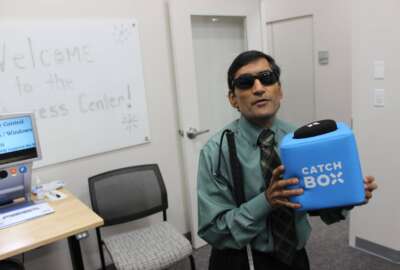For this State Department operative, the wheelchair has been a challenge but not an obstacle
She's a successful State Department negotiator dealing with the United Nations, no less. She's a lifelong athlete, excelling in several sports including rock...
She’s a successful State Department negotiator dealing with the United Nations, no less. She’s a lifelong athlete, excelling in several sports including rock climbing. And, she conducts her life from a wheelchair. Sofija Korac just received national recognition for work on behalf of people with disabilities.
Interview Transcript:
Tom Temin Let’s begin with what you actually do with the U.N. You have succeeded in getting elements of the United Nations to increase accommodations.
Sofija Korac Thank you. So I’m one of our human rights advisers here at the U.S. mission to the U.N., negotiating a wide range of issues related to human rights, including the rights of persons with disabilities. And so one of the projects we do is the U.S. Mission Co-Chairs Steering Committee on improving accessibility at the U.N., where we made some very drastic and landmark changes in the last few years, including ensuring that persons with disabilities, whether they’re coming for one week, one day or are based here in New York, can sit in an accessible manner at all U.N. meetings. It sounds like a very obvious point, but unfortunately, the U.N. took 75 years to get it done. And then most recently, we were just able to push and get them to work on installing a lift to the famous podium at the General Assembly, where you see all of the the heads of state speaking, which was not accessible to wheelchair users, including heads of state. They use wheelchairs. And so now as of this fall, they’ll be able to speak just like everybody else behind that iconic background.
Tom Temin So you do your daily work in the well-known U.N. tower right there in New York City, correct?
Sofija Korac Yes, there. And the General Assembly hall, the Security Council, the Economic Social Council really bouncing around between all of the iconic rooms.
Tom Temin Well, and that’s an old building. So when that was constructed, these considerations weren’t really part of the architecture, were they?
Sofija Korac No, they were not. And also, given the U.N. kind of unique status as an independent, the Americans with Disabilities Act doesn’t necessarily apply there. So that’s further added to the difficulties in ensuring accessibility.
Tom Temin And over the years, would you say that the people there that are responsible for the physical facilities and so forth have become more responsive to this need, just as the city around them, the state around them, the nation around them, has become so much more sensitive to that.
Sofija Korac Yes, I would say there’s still a long way to go, but a lot of progress has been made, including in the last five years I’ve been here. I think as I’ve learned in life having more delegates and a couple of ambassadors with disabilities has really opened up eyes and at all levels of the U.N. I think there’s a lot of I mentioned a couple of the achievements, but there’s been many more a day to day. And I’ve seen the changes in attitudes, which I think is the most difficult element of accessibility and inclusion to change. And that’s really continuing to change every day. Even conference to conference meetings, meeting.
Tom Temin Sure. And tell us a little bit about yourself. You have been in a wheelchair your whole life or was it an accident caused? And tell us a little bit about what your journey has been here to this point.
Sofija Korac Sure. So I was born in Belgrade, Serbia, Yugoslavia at the time, so very different worlds. I was born with a physical disability, so I’ve used either a walker or crutches or a wheelchair my whole life. And thanks to a supportive family, we were able to immigrate to the United States where I was able to pursue both my professional and personal passions. I started doing wheelchair sports as soon as we moved to the U.S., which really changed my life because for the first time ever, I was able to see more people like myself. And then that also, I think, empowered me and pushed me to want to pursue a career in human rights and international affairs. I would say too being kind of from two countries, I’ve definitely seen different kinds of challenges. But I think I keep mentioning attitude of things that has been something that has shifted on a global level. Here we have the Americans with Disabilities Act. We’re a leader in so many ways, but I think we also have come a long way in the day to day, even remembering my first day of school and the United States and all the challenges I faced there compared to when I finished my master’s degree more than 20 years later. And the changes are really every day. And I think it’s all about nothing about us without us, which is kind of the international model for persons with disabilities. I think it’s all about shifting attitudes one person at a time.
Tom Temin We’re speaking with Sofija Korac. She’s a civil service foreign policy advisor at the US Mission to the United Nations. She’s also an advocate for people with disabilities. And by the way, we should mention you were named a Careers in the Disabled Magazine 2023 Employee of the Year for Professional Accomplishments. And you work this beat, so to speak, accessibility, helping people realize their potential that have a disability in your private life also.
Sofija Korac I do. I continue. I’ve grown up doing a lot of wheelchair sports across the board, and then once I started working, I was also became a coach as well. I coached disabled children in rock climbing. I’ve also been an assistant coach with my basketball team. And also I do a lot of mentoring on the side as well when I was based in D.C. There’s a whole fellowship around incoming undergrad and graduate students with disabilities who have an interest in working for the government or on the Hill. And so I mentored several students throughout that process as well. And I’m part of various informal groups as well, mentoring both outgoing college students and master’s students, and not just in my career path, but in general, talking about how to bring mainstream disability into their work. And I always say having a disability, we always bring that perspective. But it’s really great to see persons with disabilities excelling in other career paths outside of doing disability specific work, whether they’re musicians or actors or athletes or engineers or scientists. And I’ve had an opportunity to meet many young people and mentor them and really encourage them to pursue the career and passion that they want and bring the disability perspective to everything that they do professionally and personally.
Tom Temin And your work at the State Department is more than simply advising on rights for people with disabilities, but the general panoply of human rights, correct?
Sofija Korac Correct. I’m our most senior human rights negotiator here. I also cover global health issues. So I was quite involved in all of the work on COVID-19 and all the various resolutions, as well as all the work we’ve done at the General Assembly on Ukraine. Just to give a couple of examples, but really looking at across all human rights issues.
Tom Temin That can be frustrating, I imagine in the UN context because some of the nations that end up on the Human Rights Council and these different organizations, you wonder, well, what the heck are you doing there? Given what goes on in your own nation, how do you keep it in check?
Sofija Korac I think just continuing to push forward and maintaining a sense of optimism. I think it’s having a career in human rights, it’s what you need. And on top of that, I think having being born with a disability has enshrined that sense of optimism and seeing the good in all opportunities has really pushed me forward. And I think in talking to other friends and colleagues in this field, it’s really what keeps us going and thinking back to how much the world has changed in my lifetime so far and how much more with negative also comes positive. And so just maintaining that that sense of optimism and continuing to push and push sometimes in the U.N., especially, we sit for hours and weeks negotiating over commas, which can seem frustrating to the average person and even to those of us doing it here as well. But then you get to see slow but steady progress over the years, and then you do get to see really exciting opportunities such as getting the 141 votes on the first General Assembly resolution on Ukraine after Russia’s invasion. And that’s kind of an immediate success. But but then also the small successes matter just as much.
Tom Temin Getting that comma that you want in there or maybe taking that comma out that you didn’t want there. What else should people know? I mean, the ADA has been around for a long time, and I think federal facilities have pretty much gotten around to accommodating those with disabilities. But what in this year of 2023 should people know about people with disabilities that they may not know?
Sofija Korac I think like all things being being nimble and adapting the legislation in a very practical way, I think the ADA still remains probably the most comprehensive piece of legislation we have worldwide for persons with disabilities. But I think it’s the attitudinal shifts that you cannot put on paper. And I think even at a time when the ADA was written, it was really fighting for the very basic rights and access of persons with disabilities, whether that’s employment, education. And now those of us that benefit from the ADA and future generations that continue to do so, I think it’s the knowing the persons with disabilities are everywhere and they can be in any career path, they can do anything that they want and ensuring that that’s that’s done in a very nimble way. New York City, for example, has so many challenges, despite having the ADA, just given some of the grandfather nature and the historical nature of a lot of the buildings, it’s no secret the subway system is quite challenging when it comes to being a wheelchair user. Frankly, for everybody to some degree.
Tom Temin I would say everyone. Yes.
Sofija Korac I think that’s true inclusion. Everybody is equally frustrated by the subway. But again just making sure to think about persons with disabilities as your friend, your colleague, your neighbor, that they can really do anything. And I think you cannot really capture that on paper. And so I say legislation is there as a starting point and as a point of accountability. But it’s really the attitudinal changes that that bring it to life over the years and over the decades.
Copyright © 2025 Federal News Network. All rights reserved. This website is not intended for users located within the European Economic Area.
Tom Temin is host of the Federal Drive and has been providing insight on federal technology and management issues for more than 30 years.
Follow @tteminWFED






